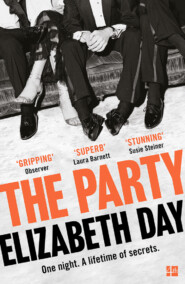По всем вопросам обращайтесь на: info@litportal.ru
(©) 2003-2024.
✖
Scissors, Paper, Stone
Автор
Год написания книги
2018
Настройки чтения
Размер шрифта
Высота строк
Поля
Charlotte turned and strode towards the car park, her silver birch earrings swinging as she walked. Anne watched her climb into the driving seat and for a brief moment their eyes met through the windscreen and both of them seemed surprised by this unexpected moment of recognition. Charlotte smiled and raised a hand. Anne nodded, more curtly than she’d intended.
Anne drove along the main roads to get back to Kew, past the fried chicken shops and the sari emporiums and the queues of tourists outside the London Dungeon and Southwark Cathedral, through the endless traffic lights that turned to red just as she approached them. It would have been quicker to go the back way but she felt the need for bright streetlamps and noise and urban chaos. It felt reassuring to see it all going on as usual, everyday life continuing undaunted beyond the hospital’s distillation of loss and hurt and illness.
Her mobile phone rang, the screen flashing up with a ghoulish light. It was Janet. ‘Oh no,’ Anne said out loud, fumbling to connect the hands-free set with one hand on the steering wheel. ‘Janet?’
‘Hello, Anne. Just calling to see how things went at the hospital today?’
It was typical of Janet to call at just the wrong moment, proffering just the wrong sort of concern – the kind that required exhaustive explanation and a decent show of emotion. Speaking to her always left one with a residual feeling of baseless unease, a sense of not having quite met up to the exacting standards of her goodness. She was so unremittingly nice it was impossible not to be irritated by her and yet simultaneously ashamed of this irritation. It made for draining conversations.
They had met years ago at the local Salvation Army Christmas carol concert, an event that Anne had found herself attending with dreary regularity in an attempt to paint herself as an upstanding and contented member of the community, a family-oriented mother and wife, a fund-raiser for assorted charities and a dedicated watcher of Antiques Roadshow. For a while, she had believed that pretending her life had some sort of meaning would actually give it some, as if the acting was half the effort.
Charles had never come along with her – he called himself an atheist and made a great show of shirking any sort of religious pomp – and this had been a relief, in a way. It allowed Anne to create an alternative persona: one of wholesome cake-baking goodness and jumble sales. She found a safety in this pretence, singing along heartily to rousing carols and contributing generously to the collection plate. She liked Christmas and discovered that seasonal festivity was the perfect opportunity for anonymity without isolation. Strangers smiled at her and caught her eye, but it was easy to elude conversation, to slip out just as the mulled wine was being poured.
That was until she met Janet. Janet had suddenly appeared one year, wreathed in jollity and home-knitted scarves, bearing Tupperware boxes filled with mince pies. She made a bee-line for Anne as soon as she spotted her trying to leave.
‘Sure I can’t tempt you?’ Janet asked, a beaming smile on her face. Anne looked at her and noticed the filmy eyes, perpetually on the brink of some extreme enthusiasm and the garish, orange-red lipstick beginning to bleed into tiny lines around her trembling mouth. She felt sorry for her, a small, unfamiliar twinge of empathy, a sense that Janet too was struggling to fit in, was desperate to find her own place in all of this communal bonhomie.
‘I was just on my way home, actually.’
‘Oh go on!’ Janet tinkled cheerily. ‘One mince pie won’t do any harm. I made them this morning. Grab one while you can.’
So Anne had taken a mince pie and the pastry had crumbled all over her coat and Janet had been so pathetically grateful that Anne stayed far longer than she wanted, trapped by the force field of Janet’s self-conscious jollity.
The friendship had stopped and started over the years, like a wheezy old car that struggled to accelerate up hills. But each time it threatened to extinguish itself completely, Janet had come up with some novel ruse to keep it going – free tickets to Chelsea Flower Show, a cake recipe she’d been dying to try out on someone, the chance to go to a lecture on Darwin’s evolutionary theory at the Natural History Museum, a new cheese shop that had just opened round the corner and was meant to stock the most fabulous Pecorino. And each time, Anne had capitulated – partly because it was easier that way and partly because, in spite of herself, she found Janet’s company strangely soothing. She never had to make any conversational effort in her presence and found it easy to let Janet’s cheerful monologues wash over her, smiling and nodding her head when it was required. She was, Anne supposed, her only real friend.
Once, but only once, Janet had stared at her across a café table and said, out of nowhere, ‘You never really listen to me, do you?’ Anne had protested unconvincingly and was mortified to see tears well up in Janet’s eyes. She couldn’t think of anything else to say, so she had lapsed into silence. After a while, the tears receded and Janet flapped her hands in front of her face. ‘Sorry. Ridiculous. Don’t know what’s wrong with me today.’ And that had been that.
This Friday, they had been due to go to Paris for the weekend – ‘A girls’ trip,’ Janet had said when they booked their Eurostar tickets – but now it all had to be cancelled. Janet was being purposely cheery about it, as if living up to her own notions of what a ‘trooper’ she was. She had insisted on dealing with all the paperwork, in enquiring about refunds and phoning up the hotel to let them know they would no longer be requiring two single rooms with en-suite showers. And then she had told Anne all about what she’d done, seeking approval with a single-mindedness that recalled a dog gripping a stick between its teeth. Anne knew that what Janet most wanted was someone to reassure her how selfless she was, how wonderful she’d been in a crisis, to say, ‘I don’t know what I’d do without you,’ and yet it was precisely because she was so needy, so oppressively grateful for any morsel of attention, that Anne found herself feeling perversely disinclined to play the game.
She knew this was mean and she was half-horrified by her own capability for small cruelties, but she couldn’t help herself. To an extent, her friendship with Janet enabled her to vent the frustrations accumulated in the rest of her life: it was the only situation she remained entirely in control of. For some reason, that was important.
‘You sound tired,’ Janet was saying now on the phone. ‘Was it a terribly draining day?’
‘No, no,’ said Anne. ‘It was fine.’ A mini-van stopped suddenly in front of her without warning. ‘Oh, bloody hell.’
‘Anne? Are you all right?’
‘Yes. Just a van driver who doesn’t know his highway code.’
Janet tittered on the end of the line. ‘So is there any update from the doctors?’
‘Much the same. They never really want to say anything in case they get sued. In any case, they’ve got to wait for the brain swelling to go down before they can be sure.’
‘Sure of what?’
‘Of whether there’s any permanent . . . well, you know, brain damage.’
There was a self-consciously dramatic intake of breath on the other end of the line.
‘They said that if he’d been wearing his bicycle helmet he might have walked away unscathed. I kept telling him to wear it,’ Anne said, rather pointlessly, she thought.
‘Are they any closer to finding out what happened?’
‘No. The police say there were no witnesses, which frankly I find hard to believe, but they never care much about cyclists, do they? The doctors think his bike was clipped by a passing car and he was thrown off. He was lucky to have landed on the road. If he had fallen into the path of a moving car, then it could have quite possibly been fatal. As it is . . . well, he’s in this coma.’
‘Goodness, Anne. How horrific.’
‘I suppose it’s just something we’ll have to deal with,’ Anne said, her impatience breaking through. ‘He might wake up tomorrow and be absolutely fine.’ She found she was unable to muster the requisite good cheer that this thought should have provoked.
‘I think you’re being a tower of strength, I really do.’
Anne stayed silent for a beat too long.
‘And you needn’t worry about Paris. Because we cancelled more than forty-eight hours in advance, the hotel has very kindly reimbursed our deposit, although it took quite a bit of doing, I tell you. My schoolgirl French isn’t what it used to be.’
Another tinkle of forced laughter.
‘Anyway, Anne, I should let you get on if you’re driving. Did you see Charlotte at the hospital?’
‘Yes, she came after work. Turned up late, obviously.’
‘Oh . . . well. That was nice of her to make the effort.’
‘Mmm,’ said Anne, non-committally. ‘I think she had a nice holiday in France with the man, although she never really tells me anything.’
‘Well, it’s a tricky one, isn’t it, Anne?’ Janet cleared her throat, preparing to take a leap into dangerous territory. ‘Perhaps she feels you might not approve.’
‘I don’t approve of him. He’s married, for goodness sake.’
‘I thought he was separated?’
‘Separated, maybe, but certainly not divorced from what I can make out.’
‘Well, Anne, these things do take time, after all.’
‘How would you know?’
There was a small, offended pause.
‘Sorry, Janet. I’m rather at the end of my tether at the moment.’
‘Of course,’ she said, the words sounding strangulated. ‘Well, look after yourself, Anne, and I’ll call tomorrow.’
‘Thank you. Bye.’
‘Bye.’
Janet hung up and Anne sat still for several minutes, hands on the steering wheel in a precise ten to two position, glaring at the traffic jam in front of her. Then, after a few minutes, she turned on the radio and rotated the volume dial until it was almost too loud to bear.









